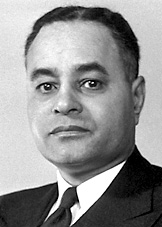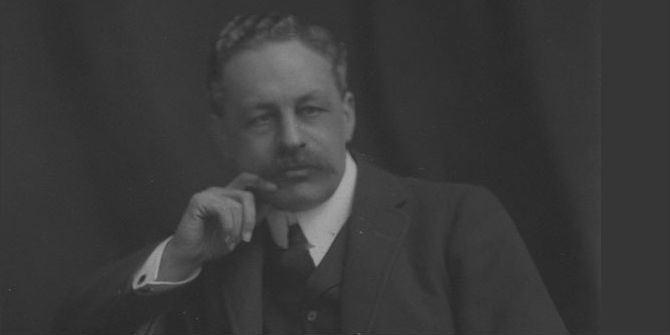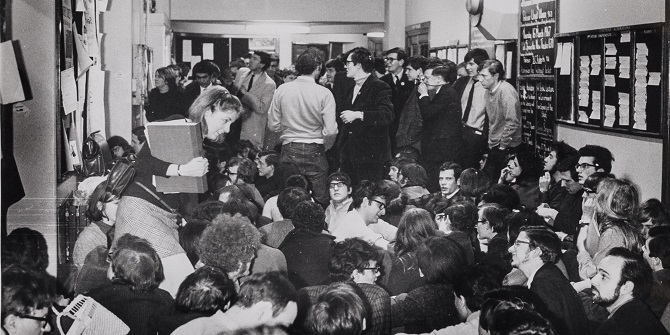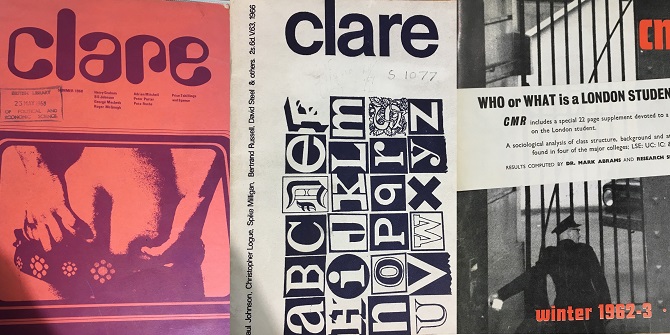LSE Archivist Sue Donnelly introduces Nobel prize winner Ralph Bunche, who was the first black American to gain a PhD in political science. After achieving his doctorate at Harvard and teaching at Howard University, Ralph Bunche came to LSE to study anthropology under Bronislaw Malinowski during 1936-37. His later career spanned the United Nations and American civil rights movement and he was awarded the Nobel Peace Prize in 1950.
In 1935 Ralph Bunche was preparing an application to the US Social Science Research Council for funding to undertake further training in anthropology. Dr Donald Young of the SSRC suggested he write to Bronislaw Malinowski and arrange to spend six months at LSE prior to undertaking his research. Ralph Bunche wrote to Professor Malinowski on 19 October 1935:
I feel the need of additional preparation in the field of anthropology.
Ralph Bunche was born in Detroit, Michigan, but his mother’s poor health led the family to move to Albuquerque, New Mexico. After his mother’s death Bunche and his sister were brought up by his grandmother, Lucy Taylor Johnson, in Los Angeles. Bunche graduated from UCLA in 1927 summa cum laude and won a scholarship to Harvard supplemented by a donation of $1,000 from the Los Angeles black community. In 1928 he gained a Master’s degree and in 1936 a doctorate from Harvard for a thesis on French colonial rule in Togoland in West Africa. He was the first black American to gain a PhD in political science. Bunche combined his studies with a post as associate professor at Howard University in Washington DC.

In his letter of 19 October 1935 Bunche wrote to Malinowski of his:
… interest in the impact of western civilization and colonial policy upon native populations, particularly the African. I feel the need of additional preparation in the field of anthropology.
Bunche reminded Malinowski that they had met in London in 1933 when Bunche visited the black American anthropologist Allison Davis, then studying at LSE on a Julius Rosenwald Fellowship for Foreign Study.
Malinowski replied on 1 November and remembered their previous meeting. He believed there should be no formal difficulties in studying at LSE but advised Bunche to attend for the first two terms of the 1936-1937 academic year:
… because then I propose to give a brief preliminary survey of the theory of culture, and in connection with this, seminars and discussions on specific problems, usually from people with field work experience or preparing to go out.
Malinowski also suggested talking to his colleagues Lucy Mair and Audrey Richards who were interested in cultural change and contact and noted that “a sensible person can live on £20 a month” in London.
On 14 March 1936 Bunche wrote to announce the success of his application but warned that he would not be able to arrive until late December. He did ask for a reading list as he wanted to begin work as soon as possible. In reply Malinowski asked for details of Bunche’s earlier work and advised him to read Émile Durkheim, Henri Hubert, Marcel Mauss and Lucien Lévy-Bruhl alongside a number of anthropological monographs – including Malinowski’s own work.
Bunche finally arrived in February 1936 accompanied by his wife Ruth, and daughters Joan and Jane. He was preceded by a letter of recommendation from Tracy Kitteridge of the Rockefeller Foundation and had spent the autumn with the anthropologists at the University of Chicago.
Bunche regularly attended Malinowski’s Thursday afternoon seminar on The Comparative Study of Culture though his diary implies that he found Malinowski “very whimsical”, “vain and dogmatic, but extremely able”. The seminar was stimulating though he retained some scepticism about Malinowski. Through the seminar Bunche met Jomo Kenyatta, who gave him weekly Swahili lessons. There were other black Americans in London and Bunche knew George Padmore, who had been his student at Howard University, and Paul Robeson, whose wife Eslanda, had studied at LSE 1933-1935. Through a fellow student, the South African lawyer, Julius Lewin, Bunche was introduced to Harold Laski.
In September 1937 Bunche set sail for South Africa after spending time in Holland, Belgium and France. In South Africa his mentor was Isaac Schapera at the University of Cape Town, who had studied for his doctorate at LSE and was to return here in 1950.
Bunche’s later career was closely associated with the United Nations and in 1950 he won the Nobel Peace Prize for his part in securing the 1949 Armistice Agreements between Israel and Egypt, Lebanon, Jordan and Syria, ending the 1948 Arab-Israeli War. Bunche became undersecretary-general of the UN in 1968. He was also very active in the American civil rights movement participating in the 1963 March on Washington for Jobs and Freedom and the 1965 march from Selma to Montgomery, Alabama supporting the voters’ registration campaign.
Ralph Bunche died in 1971.
Browse more LSE History Blog posts from the Anthropology collection





